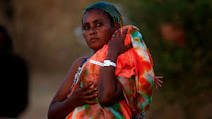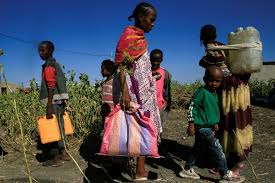
- There are reports of serious violations of human rights on all sides of the conflict in Tigray, which is becoming increasingly internationalised. There appear to be a number of armed actors and militia’s committing violations.
- The most pressing need is for the parties to agree on an immediate ceasefire and uphold international humanitarian and human rights law including granting humanitarian access. Several humanitarian workers from the Danish Refugee Council and an International Rescue Committee worker have sadly been killed.
- There are disturbing reports of shortages of food, water, fuel, and critically money as banking systems remain down. Supplies have been disrupted and stocks depleted. Commercial access is as important as humanitarian access to ensure the survival of the civilian population.
- Millions of people across Ethiopia rely on donor-funded humanitarian and development programmes. Most of the 600,000 people in Tigray who rely on food aid have not received their rations since October. How much of the more than £3 billion of UK aid given to Ethiopia in the past decade has reached people or projects in Tigray?
- Eritrean refugees in camps, who are enrolled in the Ethiopian governments anti-famine cash transfers mechanisms (which is partly funded by the UK), are being denied the assistance they deserve because of the conflict.
- Preliminary UN reports suggest the closure of health facilities due to power and fuel shortages have left people in the region, including pregnant women, without any services within 400 kilometres. Food prices in the markets visited in Afar have reportedly doubled or tripled in most areas. In some places, including in Abaala and Galaiso, women are forced to travel up to 25 km to fetch water, exposing them to heightened risks of gender and sexual violence.
- Sixteen humanitarian INGOs with 596 staff (international and national) and other national non-governmental organisations are present in Tigray. Since the conflict has erupted, activities of the humanitarian organisations have been suspended.
- In the Tigray region, important projects – such as one supporting women’s empowerment through self-help organisations leading to enterprise development – have been suspended.
- NGOs have not been allowed to access Tigray, Amhara and Afar regions to undertake assessments and begin a response with 8 pending assessments n requested by humanitarian agencies. These assessments need to be agreed by the Ethiopian Government through applications to UN OCHA. The Ethiopian Government ministries are themselves unclear how the process works. Repeated hopes that assessments will be approved have been dashed.
- One of the pre-assessment security missions organised by UN was shot at, the team was detained but has now been released.
- One simple recommendation supported by humanitarian agencies is for Ethiotel to restore phone connection for humanitarian workers. Many aid agencies have lost contact with their field staff in the region or have very irregular contact preventing crucial information, news and data of the impact on the conflict on civilians from getting through.
- It is also vital that humanitarian organisations are able to access civilians in all areas, not just those under government control.


